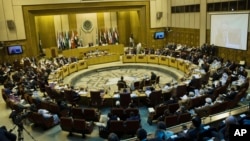The Arab League has postponed its effort to form a regional military force to fight Islamic State militants in Libya, apparently because the league's members are divided in their views on the civil war in the north African state.
Analysts said the indefinite delay, announced before the meeting scheduled for Thursday in Cairo, grew out of the one of the original obstacles facing a pan-Arab force.
“It is because of the constant disputes,” said Kamel Abdullah, a researcher at Al-Ahram Center for Political and Strategic Studies in the Egyptian capital. “They may agree on the principle, but they continue to argue about how to implement the project.”
Agreement in principle
The principle they agree on is that Libya must be rescued from militants taking over towns and cities and terrorizing the populace.
The Arab League members also agree that any assistance from governments outside the region is unlikely, in the aftermath of NATO's intervention in Libya in 2012 that left the country in chaos.
Saudi Arabia's request to delay Thursday's talks was supported by Bahrain, Kuwait, Qatar, the United Arab Emirates and Iraq, according to an Arab League statement. It said a new date for taking up discussions on a pan-Arab regional force would be announced in the future.
Where Arab League members disagree is the desired outcome of the civil war in Libya.
At a meeting last week, Libyan Foreign Minister Mohammed al-Dairi appealed to the league to supply his army with weapons and air support to bolster its resistance against Islamic State fighters.
The Arab League responded with a resounding “yes” to the Libyan request. If any member states disagreed, they remained silent.
One of two governments
However, no one mentioned the fact that al-Dairi represents only one of two competing governments in Libya.
Al-Dairi represents the Libyan government in the eastern city of Tobruk, largely recognized by the international community. Libya’s alternate government, supported by Islamists, sits in the traditional capital, Tripoli.
“Both governments have social support, were built within a legal framework, are politically viable and have armies,” said the Al-Ahram Center's Abdullah. And it seems highly unlikely that the Arab League would agree to arm both sides in the civil war.
The United Nations expects peace talks on Libya to produce an agreement within weeks, but that goal appears elusive. A senior negotiator from the rival Tripoli government quit the talks Wednesday without explanation.
UN discussion seen as 'empty'
“Nobody really believes in the U.N. talks,” said Yan St. Pierre, who heads the Berlin-based security firm MOSECON. “They see it as being empty discussions, and more designed to show that something is going on rather than having a real impact.”
St. Pierre said there has been some military coordination on Libya, such as airstrikes that were launched against Islamic State fighters in February.
Despite political disputes among the Arab League members, the Berlin-based security executive said, they also see the consequences of taking no action at all would be disastrous.
“I think they feel that they have no choice but to act,” he said. “They need to build some type of coalition that will actually get something done and bring about a certain level of stability in Libya. That conflict is making them unstable.”





